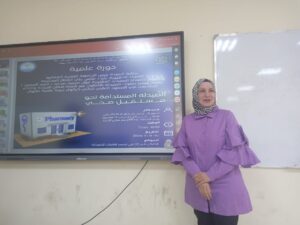Under the patronage of the President of the Northern Technical University, Professor Dr. Alia Ali Abbas Al-Attar, and under the supervision of Assistant Professor Dr. Lizan Madhat Muhammad, Dean of the Kirkuk Technical Medical Institute, the Department of Pharmacy Technology, in cooperation with the Quality Assurance and University Performance Division, organized a scientific workshop entitled “Sustainable Pharmacy Towards a Healthy Future”
Presented in the course:
1. Dr. Barkal Suleiman Mustafa
2. Eng. Shanai Rajab Hassan
3. Asst. M.M. Umaima Abdul Karim Muhyiddin
The course included several key topics, including:
1. Introduction to Sustainable Pharmacy
o Definition of Sustainable Pharmacy
o Aspects of Sustainable Pharmacy
o Environmental Costs of Pharmaceuticals
o Manufacturing
o Chemicals, reagents, solvents, and other chemicals used in manufacturing processes that lead to environmental pollution
3. Water Problems: The production process often requires large amounts of water, used for everything from cleaning to chemical reactions.
4. Energy Consumption: Pharmaceutical production is known for its high energy consumption, relying on complex processes and specialized equipment.
5. Waste Disposal
The course aimed to:
Sustainable Pharmacy: An emerging field that aims to integrate environmental and social principles into the pharmaceutical industry. This field seeks to reduce the environmental impact of the industry without compromising its therapeutic efficacy. It combines medicine, pharmacy, and ecology to achieve a balance between healthcare and environmental conservation.
The course concluded:
The procedures included in sustainable pharmacy in the manufacturing of medicines by companies and healthcare institutions play a pivotal role in achieving sustainable development goals by developing environmentally friendly materials and technologies, which contribute to reducing pollution and enhancing resource efficiency. It also emphasized the importance of research and development in the field of green chemistry, particularly in renewable energy production, water treatment, and sustainable industries. The course emphasized the need for collaboration between academic and industrial institutions to develop innovative solutions that support sustainability, while emphasizing the importance of policies and legislation that encourage the widespread adoption of these practices.


